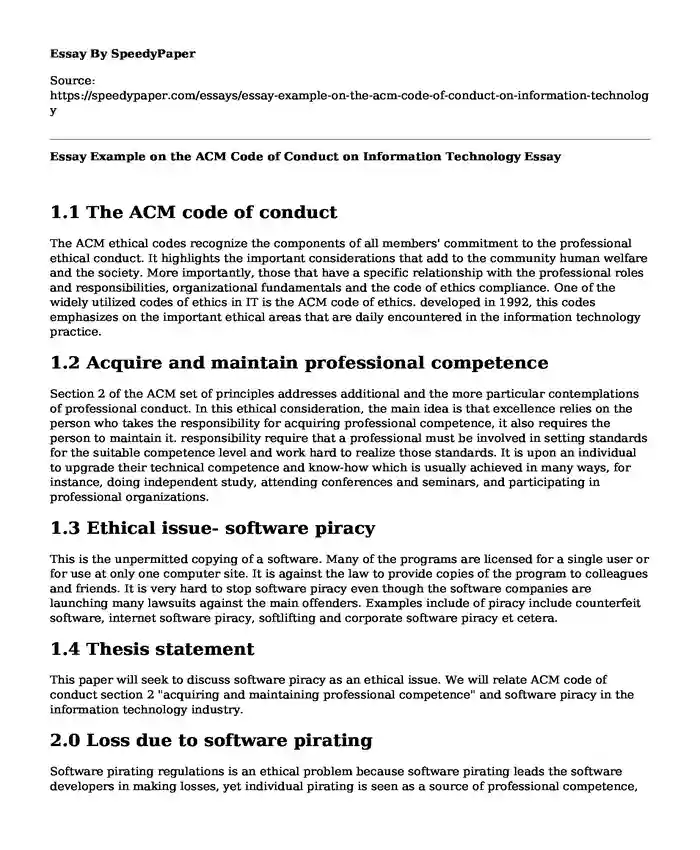
| Type of paper: | Essay |
| Categories: | Software Ethics Cyber security |
| Pages: | 3 |
| Wordcount: | 818 words |
1.1 The ACM code of conduct
The ACM ethical codes recognize the components of all members' commitment to the professional ethical conduct. It highlights the important considerations that add to the community human welfare and the society. More importantly, those that have a specific relationship with the professional roles and responsibilities, organizational fundamentals and the code of ethics compliance. One of the widely utilized codes of ethics in IT is the ACM code of ethics. developed in 1992, this codes emphasizes on the important ethical areas that are daily encountered in the information technology practice.
1.2 Acquire and maintain professional competence
Section 2 of the ACM set of principles addresses additional and the more particular contemplations of professional conduct. In this ethical consideration, the main idea is that excellence relies on the person who takes the responsibility for acquiring professional competence, it also requires the person to maintain it. responsibility require that a professional must be involved in setting standards for the suitable competence level and work hard to realize those standards. It is upon an individual to upgrade their technical competence and know-how which is usually achieved in many ways, for instance, doing independent study, attending conferences and seminars, and participating in professional organizations.
1.3 Ethical issue- software piracy
This is the unpermitted copying of a software. Many of the programs are licensed for a single user or for use at only one computer site. It is against the law to provide copies of the program to colleagues and friends. It is very hard to stop software piracy even though the software companies are launching many lawsuits against the main offenders. Examples include of piracy include counterfeit software, internet software piracy, softlifting and corporate software piracy et cetera.
1.4 Thesis statement
This paper will seek to discuss software piracy as an ethical issue. We will relate ACM code of conduct section 2 "acquiring and maintaining professional competence" and software piracy in the information technology industry.
2.0 Loss due to software pirating
Software pirating regulations is an ethical problem because software pirating leads the software developers in making losses, yet individual pirating is seen as a source of professional competence, computer literacy and that they may in future lead to the purchase of the software (Tavani 2003). In 2002, 39% of business application programs were pilfered in the U.S. Programming theft can be expensive, particularly for companies as it prompts noteworthy misfortunes. In 2002 alone, the product business in the U.S. lost a sum of $13 billion (Peslak 2007). When software pirating is done on a large scale it leads to serious loss to the manufacturers of the software. On the other hand, through individual pirating the person is seen to acquire and maintain the competence required in the information technology arena.
2.1 reduction of incentive to develop new software
Software pirating is an ethical problem as small software developing companies incur big losses while large companies like Microsoft hardly feel the loss. They have ways of protecting their software. Most small-scale industries are largely affected by software pirating making a lot of losses which eventually lead to the closure of the business. This reduces the incentive to develop new soft wares reducing the acquirement and maintenance of professional competence (Reynolds 2011). When firms withdraw from the software business many employees become jobless narrowing their chance to acquire and maintain professional competence as they fear that their new software will be pirated.
2.2 Conflicting laws
Software pirating is an ethical problem because researchers in almost all disciplines cannot afford to purchase the licenses and thus procure the software illegally. The U.S. has enacted intellectual property laws that prohibit the software piracy. On the other hand, copyright laws offer the possibility of instances where the software piracy may be justified (Council 2008). This conflicting laws makes software piracy a major ethical issue in the IT field.
3.0 Conclusion
In conclusion, software piracy is an ethical dilemma that needs to be addressed. It is true that the losses that are suffered by software companies affect the industry profitability, research, and development of new software, less revenue to justify reducing software price and taking serious actions by the manufacturers to protect their business income. The argument whether it is morally upright and justifiable should be discussed and practical solutions made to tackle the issue.
References
Council, A. C. M. (2008). ACM code of ethics and professional conduct, October 1992. URL http://www. acm. org/about/code-of-ethics.
Peslak, A. R. (2007). A review of the impact of the ACM code of conduct on information technology moral judgment and intent. Journal of computer information systems, 47(3), 1-10.
Reynolds, G. (2011). Ethics in information technology. Cengage learning.
Tavani, H. T. (2003). Ethics and technology: Ethical issues in an age of information and communication technology.
Outline
1.0 Professional responsibilities of the ACM code of conduct
1.1 The ACM code of conduct
1.2 Acquire and maintain professional competence
1.3 Ethical issue- software piracy
1.4 Thesis statement
2.0 Loss due to software pirating
2.1 reduction of incentive to develop new software
2.2 Conflicting laws
3.0 Conclusion
Cite this page
Essay Example on the ACM Code of Conduct on Information Technology. (2022, Apr 25). Retrieved from https://speedypaper.net/essays/essay-example-on-the-acm-code-of-conduct-on-information-technology
Request Removal
If you are the original author of this essay and no longer wish to have it published on the SpeedyPaper website, please click below to request its removal:
- Essay Sample on Democratic Decision-Making Process
- Essay Example on Adjustment Difficulties in Adolescence
- Religion Essay Sample: Different Perspectives Towards Hinduism
- Essay Example on Offshore Oil and Gas Drilling
- Essay Sample Answering How Voter Turnout Could Be Increased in Texas
- Free Essay: Application for a Graduate Research Executive Position.
- Essay Example - Email Message Template
Popular categories




